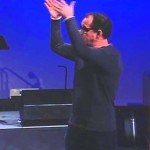We run our website the way we wished the whole internet worked: we provide high quality original content with no ads. We are funded solely by your direct support. Please consider supporting this project.
Your Spiritual “Say-So”
In yesterday’s post, I summarized what Jesus and the rest of the Bible says about prayer. For many, that is enough. “God said it, I believe it, that settles it for me.” But for others, like myself, the practice of petitionary prayer raises a number of theological questions that need to be answered.
The trouble is that, at first glance, trying to impact God and change the world through prayer doesn’t seem to make any theological sense. I used to struggle with this a lot. I’d be praying and all of a sudden wonder, “Why am I doing this?” Yes, I was obeying God. But what was I actually accomplishing, I wondered? Am I trying to twist God’s arm to get him to do something he doesn’t already want to do, like a child stubbornly pestering a parent to give him a new toy? That surely couldn’t be right. If God didn’t already want to do what I was asking him to do, then what I’m asking him to do clearly isn’t the best thing to do, since if it were, the all-good God would already want to do it.
On the other hand, if I’m asking God to do something he already wants to do, then I again have to wonder what I’m accomplishing by asking him to do it. If God wants to do something because it’s the best thing to do, it seems he would do it whether I pray or not, since God is all-good and always does what is best.
So whether I’m praying about something God wants to do or doesn’t want to do, it seems my prayer is useless. It seems I’m engaging in a nonsensical, pro forma activity.
I suspect it’s reasoning like this that leads many to adopt the cliché that prayer is for our sake, not Gods. Given that God is all-powerful, all-good and all-wise, folks simply can’t fathom any other purpose that prayer could possibly serve.
Yet, since this is clearly an unbiblical position, we need an alterative way of understanding prayer. The questions I’m going to try to answer are a) What possible difference can prayer make to an all-good and all-powerful God?, and b) Why would an all-wise God leverage so much of his will being done on earth on whether or not his people talk to him?
My questions began to be resolved years ago when I began to think about prayer in light of God’s purpose for creation. God created humans to be his viceroys on the earth. We were placed here to administrate God’s loving providence “on earth as it is in heaven.” Out of the fullness of life we get from our relationship with God, we were to reflect God’s loving character and purpose to each other, the animals and the earth. He gave us “say-so” over this domain, with the goal that we would lovingly choose to align our “say-so” with his “say-so” so that his loving “say-so” would reign on the earth through us. We were to be co-laborers with God and co-rulers with Christ (2 Tim. 2:12; Rev. 5:10, 20:6), thus ensuring that the earth would be the domain of God’s reign — the Kingdom of God.
Now, we all know we have “say-so” on a physical level. Our ideas, words and bodily activity impacts others and affects what comes to pass, for better or for worse. But what the Bible’s teaching on prayer reveals is that this isn’t our only – or even our primary – “say-so.” We also have a “say-so” to impact God and affect what comes to pass on a spiritual level, and this “say-so” is activated when we communicate with God.
In this light, it’s really no more difficult to understand why God would to some extent leverage his will being done “on earth as it is in heaven” on prayer than it is to understand why God would to some extent leverage anything on our choice to use our physical ‘say-so” in various ways. If God wants a world that is capable of sharing in and reflecting his love, he must populate it with free agents who have their own “say-so” – and to this extent the accomplishing of his “say-so” on earth must depend on how we freely choose to use our “say-so.”
Everything about God’s purpose for creation is centered on our choosing to enter into a loving relationship with him. Relationships are all about communication. We relate to others only as we communicate ourselves in a variety of ways to them and they communicate themselves to us. Relationships and communication are two sides of the same coin.
So, if the central goal of creation is a relationship with God that empowers humans to be God’s viceroys on the earth, it makes sense that God would design the world such that communicating with him would be a central means by which we carry out our viceroy duties. While it violates the common sense of our carnal minds to trust in prayer, if you think about the matter in terms of God’s purpose for creation, it makes sense that the most important exercise of our “say-so” would be bound up with our communication with God.
Category: General
Tags: Kingdom Living, Prayer, Relationships
Related Reading

Responding to Critics of a Pacifist View of the Syrian Crisis-Part 2
United Nations Photo via Compfight Yesterday I posted a response to Tyler Tully’s criticism of some of my thoughts on the Syrian crisis. The second blog I’d like to review is Two Friars and a Fool by Aric Clark. Like Tully, Aric approved of much of what I said, but also like Tully, he raised several…

When to Do Spiritual Warfare
If the world is engulfed in spiritual warfare, how do we know when we’re confronting a demon that requires deliverance prayer, or simply confronting a “natural” by-product of the fallen world that requires medical or therapeutic attention? A few years ago, a man from my church called me saying that he had been attacked by…

Sermon Clip: Brain Reign
In this short clip, Greg Boyd discusses the 3 parts to who we are to help understand the brains role. What does role does the mind, body, and spirit play in who we are? In the full sermon we look at the New Testament teaching on reigning over the relational brain. Understanding how God wired…

Some Questions a Year After Her Child’s Death
Jessica Kelley wrote a post for The Jesus Event that we wanted to share with you. You might remember that last year we were getting to know Jessica as she lost her four year old son Henry just before Christmas. In this post, she reflects on the theology of the people around her concerning her son’s death. She has…

Hearing and Responding to God: Part 2
In this video, Greg continues his thoughts about the difficulties we can encounter when we try to hear God speaking to us. You can view the first part here.

Let Us Pray
Per Ola Wiberg via Compfight It’s appropriate to pray and reflect and run to God when tragedies like the one in Newtown, CT take place. We wanted to share a couple of things we found helpful around the blogosphere as we struggle through our sadness. T.C. Moore shared some thoughts on Darkness, Advent, and Newtown CT on…

